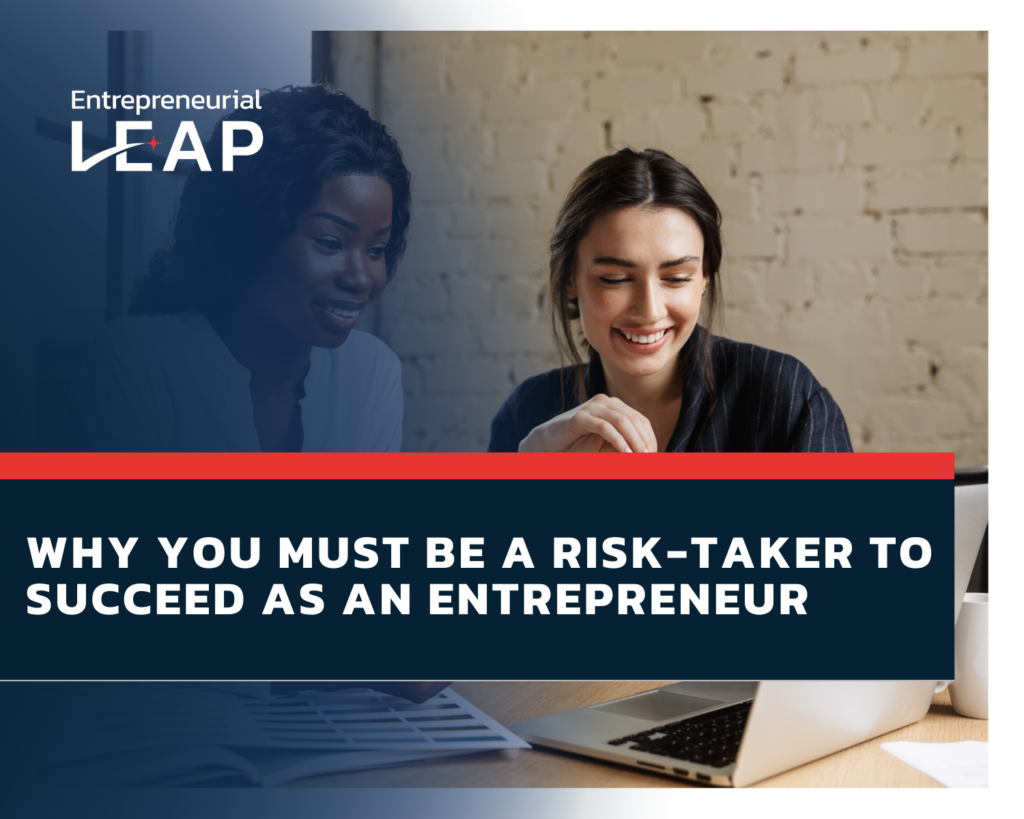
A Deeper Dive Into the 3rd Essential Trait: Problem-Solver
The third of the six essential traits that all entrepreneurs-in-the-making must possess that we discuss in Entrepreneurial Leap is Problem-Solver. Being a problem-solver is as

Not everyone is cut out to be an entrepreneur. One of the most defining traits that separates entrepreneurs from those who only dream about starting a business is the ability to take risks.
Entrepreneurs are willing to step into the unknown, challenge the status quo, and act boldly in the face of uncertainty. They’re not reckless—but they are courageous.
In Entrepreneurial Leap, Gino Wickman explains that being a risk-taker isn’t something you learn—it’s something you’re wired for. And without it, the entrepreneurial path will always feel out of reach.
So, if you’ve ever wondered whether you’re truly built for entrepreneurship, start by asking yourself this:
Am I willing to take the leap—even if there are no guarantees?

Being a risk-taker doesn’t mean diving in blindly. It means evaluating the odds and choosing action anyway. Entrepreneurs take calculated risks—not reckless ones. They weigh potential outcomes, trust their instincts, and move forward even when the path isn’t clear.
Risk-takers disrupt, innovate, and reject “safe.” They’re rule-breakers, idea-chasers, and momentum-makers. They get a high from shaking things up—and they understand that failure is part of the process, not the end of the road.
“If you cannot risk, you cannot grow. If you cannot grow, you cannot become your best. If you cannot become your best, you can’t be happy. If you can’t be happy, what else matters?”

The truth is, many people have great ideas. They’re passionate, responsible, hardworking, and full of potential. But they stop short of building something because they can’t stomach the risk.
They fear failure. They fear embarrassment. They fear instability and change.
When the moment comes to leap, they freeze. And that hesitation is what keeps them stuck.
This is why Gino Wickman emphasizes that risk-taking is non-negotiable. If you’re not naturally wired for it, entrepreneurship may not be the right path—and that’s okay. But if you are, it’s time to stop hesitating and start moving.

Entrepreneurs don’t just take one big leap—they take dozens of smaller (and sometimes massive) risks throughout their journey. These risks come in different forms, often layered together, and they’re part of what makes the entrepreneurial path so challenging—and so rewarding.
Here are the most common types of risk entrepreneurs must face, manage, and grow through:
This is one of the most obvious and intimidating risks. Entrepreneurs often leave stable jobs, invest their own savings, and operate without a consistent paycheck—sometimes for months or even years. Starting a business may mean maxing out a credit card, cashing in a 401(k), or bootstrapping with limited capital.
But here’s what makes the difference: true entrepreneurs aren’t careless with money—they’re courageous with it. They understand that strategic financial risk is often the price of future freedom. They take the leap not because it’s comfortable, but because the potential upside is worth it.
Putting yourself—and your ideas—out into the world is emotionally risky. Entrepreneurs deal with constant uncertainty, self-doubt, criticism, and the fear of looking foolish if things don’t work out. Every launch, pitch, or post carries the weight of possible rejection.
But entrepreneurs understand this truth: you can’t build something meaningful while playing it emotionally safe. The vulnerability that comes with entrepreneurship is part of the process, and the emotional discomfort is a sign that you’re doing something bold.
Many entrepreneurs step away from jobs that provide security, structure, and consistent income. It’s not just about money—it’s about walking away from a path they’ve already invested years in: education, promotions, reputation.
The decision to pivot into entrepreneurship can look irrational from the outside, but for a risk-taker, the bigger risk is staying stuck in a life that doesn’t align with their vision. Successful entrepreneurs would rather bet on building something new than settle for predictable and unfulfilling.
Any time you go against the grain, people will talk. Entrepreneurship often requires being misunderstood, second-guessed, or judged—especially in the early stages when your idea is still unproven.
You may risk your reputation with friends, family, former colleagues, or even your professional network. But entrepreneurs don’t let that stop them. They’re willing to put their name and credibility on the line if it means making a bigger impact.
“The status quo is never good enough for a true entrepreneur. They’re more concerned with progress than popularity.” – Entrepreneurial Leap
To succeed, entrepreneurs must do something new—or do something familiar in a completely new way. That means launching untested products, pioneering unique business models, or serving markets others overlook.
Innovation is inherently risky because there are no guarantees. But without it, there’s no edge. Entrepreneurs understand that real growth lives on the edge of uncertainty. Every major innovation—from the iPhone to Airbnb—was once seen as risky or even foolish.
Ask yourself:
If your answers are “yes,” odds are, this trait lives inside you. You might already be taking entrepreneurial-style risks without even realizing it.

Even if you’re naturally cautious, you can begin to build a more confident relationship with risk. Here are a few ways to flex that muscle:
Take micro-risks: launch a pilot, test an idea, or make a bold ask. Each win builds momentum.
Instead of focusing on what could go wrong, ask, What if this actually works?
If you’re 70% confident with 70% of the information, act. You can iterate as you go.
If risk isn’t your strong suit, build a team with complementary strengths. Their confidence can help pull you forward.
Here’s the thing most people miss: staying safe is a risk too—the risk of regret.
Entrepreneurs don’t just bet on ideas—they bet on themselves. They know they might fail. But they also know the bigger failure would be never trying at all.
“A risk-taker doesn’t plan to fail, but they’re not afraid of it either. They understand that the worst-case scenario is growth.” – Entrepreneurial Leap
Being a risk-taker is just one piece of the puzzle. If you want to find out whether you have all 6 Essential Traits that every successful entrepreneur shares, take the next step.
✅ Take the Entrepreneur-in-the-Making Assessment
✅ Grab your copy of Entrepreneurial Leap
✅ Join the Entrepreneurial Leap Academy and surround yourself with the tools, training, and mentorship to launch your entrepreneurial future.
Your journey doesn’t start when you have it all figured out.
It starts when you’re bold enough to take the leap.

The third of the six essential traits that all entrepreneurs-in-the-making must possess that we discuss in Entrepreneurial Leap is Problem-Solver. Being a problem-solver is as